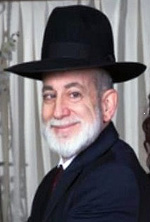By Rabbi Yaakov Marks

SAN DIEGO– One of the most dedicated and trusted leaders in history was Moshe. He left a wonderful life and his family in Midian, journeying a great distance to Egypt to fight for his people’s freedom from slavery. He constantly put his life in danger while approaching pharaoh, demanding and bargaining for his people’s release. As Moshe led the Jewish people out of Egypt and through the wilderness, he repeatedly ignored the verbal abuse he received when things didn’t go the way people wanted them to go. With the love of a parent comforting a crying child, Moshe only focused on how to help those who complained about him. During the incident of the golden calf, Moshe even offered to forfeit his life in order to save his nation. Time after time Moshe showed his sincere love and dedication for the people. All Moshe’s financial needs were paid from his personal bank account; Moshe did not collect a penny from the national treasury for his service. Imagine a leader with such love and selfless dedication, giving his life for his people and doing it all without accepting a penny in payment.
As the Mishcan (the portable tabernacle) neared completion, the materials that were collected from the people were used up. All of the donations were used solely for the construction of this holy building. The hundreds of spiritual and dedicated individuals who were involved in this monumental task worked only for merit, not accepting any monetary compensation. The splendor of this wonderful building left people in awe. The dedication of the Mishcan was now being planned.
Before the final dedication of the Mishcan could take place, an audit had to be performed. Moshe had requested a thorough accounting of all the materials donated and where they were used. Why was this audit necessary? Moshe was in charge. Could anyone have a more honest and trustworthy person overseeing this task? Why would anyone suspect Moshe of any wrong doing?
Many commentators say that Moshe did this accounting to fulfill the commandment, “and you will be Innocent in the Eyes of G-d and the people.” A person involved in charitable collections needs to show everyone that he was honest. Moshe made the accounting to keep the people from suspecting him of any wrong doing. Why does G-d need an accounting? Doesn’t He know everything?
Rabbi Israel Salanter offers a different insight. The Talmud says, “The majority of people are suspected of theft, a minority of immorality, and everyone is suspected of a tinge of gossip.” The Talmud does not mean to accuse the majority of people of theft; it is only that when left alone and confronted with money, the majority of people could rationalize a reason to make an illegal gain. Moshe didn’t make the accounting after the fact; he used the accounting during the fact to keep himself honest. Moshe was teaching a tremendous lesson that accountability is not a weakness; it is a strength. Nobody should consider himself great enough not to need the support of others. Every great and successful person has a mentor or peer whom they use for support. Even King Solomon, the wisest of all people, was instructed by his father not to do things without consulting advisors. How can we dare to tell our friends and mentors, “I don’t need your help, I can do it by myself?” Moshe is telling us that when left alone even Moshe himself had a fear of possible rationalizing and thereby doing something wrong. This accounting by a peer would now keep him innocent in the eyes of G-d and man.
May we be blessed with the wisdom to see the great benefits of mentors and coaches. May we have the merit to overcome our false pride and humbly accept the advice and guidance of others. May we merit the joy of, “Being innocent in the eyes of G-d and man.”
*
Rabbi Marks is a certified health coach who may be contacted via ahealthyrabbi@gmail.com.